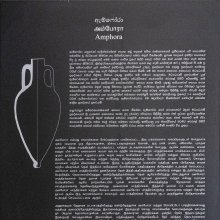Agu, Āgu, Agù: 13 definitions
Introduction:
Agu means something in Hinduism, Sanskrit, Buddhism, Pali, Jainism, Prakrit, biology. If you want to know the exact meaning, history, etymology or English translation of this term then check out the descriptions on this page. Add your comment or reference to a book if you want to contribute to this summary article.
Images (photo gallery)
Biology (plants and animals)
Source: Google Books: CRC World Dictionary (Regional names)1) Agu in Ghana is the name of a plant defined with Ceiba pentandra in various botanical sources. This page contains potential references in Ayurveda, modern medicine, and other folk traditions or local practices It has the synonym Eriodendron anfractuosum var. africanum DC. (among others).
2) Agu is also identified with Coix lacryma-jobi It has the synonym Sphaerium lacryma Kuntze (etc.).
Example references for further research on medicinal uses or toxicity (see latin names for full list):
· A General History of the Dichlamydeous Plants (1831)
· Nucleus (1994)
· Revisio Generum Plantarum (1891)
· Methodus (Moench) (1794)
· Journal of Cytology and Genetics (1990)
· De Fructibus et Seminibus Plantarum (1791)
If you are looking for specific details regarding Agu, for example diet and recipes, pregnancy safety, side effects, health benefits, extract dosage, chemical composition, have a look at these references.

This sections includes definitions from the five kingdoms of living things: Animals, Plants, Fungi, Protists and Monera. It will include both the official binomial nomenclature (scientific names usually in Latin) as well as regional spellings and variants.
Languages of India and abroad
Pali-English dictionary
Source: BuddhaSasana: Concise Pali-English Dictionaryāgu : (nt.) guilt; offence.
Source: Sutta: The Pali Text Society's Pali-English DictionaryĀgu, (nt.) (for Vedic āgas nt.) guilt, offence, S.I, 123; A.III, 346; Sn.522 = Nd2 337 (in expln. of nāga as āguṃ na karotī ti nāgo); Nd1 201. Note. A reconstructed āgasa is found at Sdhp.294 in cpd. akatāgasa not having committed sin.

Pali is the language of the Tipiṭaka, which is the sacred canon of Theravāda Buddhism and contains much of the Buddha’s speech. Closeley related to Sanskrit, both languages are used interchangeably between religions.
Sanskrit dictionary
Source: DDSA: The practical Sanskrit-English dictionaryAgu (अगु).—a.. [नास्ति गौर्यस्य (nāsti gauryasya)] Ved.
1) Destitute of cows or rays; poor. उक्थं चन शस्यमानमगोः (ukthaṃ cana śasyamānamagoḥ) Ṛgveda 8.2.14.
2) Wicked (?).
-guḥ 1 Name of Rāhu.
2) Darkness.
Source: Cologne Digital Sanskrit Dictionaries: Shabda-Sagara Sanskrit-English DictionaryĀgū (आगू).—f.
(-gūḥ) An agreement. E. āgama to come, ḍū affix or āṅ prefixed to gū to come and kvin affix; also āgur.
Source: Cologne Digital Sanskrit Dictionaries: Cappeller Sanskrit-English DictionaryAgu (अगु).—[adjective] having no cows, poor.
Source: Cologne Digital Sanskrit Dictionaries: Monier-Williams Sanskrit-English Dictionary1) Agu (अगु):—[=a-gu] mfn. ([from] go with a), destitute of cows, poor, [Ṛg-veda viii, 2, 14]
2) [v.s. ...] m. ‘destitute of rays’, Name of Rāhu the ascending node.
Source: Cologne Digital Sanskrit Dictionaries: Goldstücker Sanskrit-English DictionaryAgu (अगु):—[bahuvrihi compound] I. m. f. n.
(-guḥ-guḥ-gu) 1) Having no cows.
2) Having no beams. Ii. m.
(-guḥ) A name of Rāhu or the ascending node q. v. E. a and go.
Source: Cologne Digital Sanskrit Dictionaries: Yates Sanskrit-English DictionaryĀgū (आगू):—(gūḥ) 3. f. Agreement.
[Sanskrit to German]
Sanskrit, also spelled संस्कृतम् (saṃskṛtam), is an ancient language of India commonly seen as the grandmother of the Indo-European language family (even English!). Closely allied with Prakrit and Pali, Sanskrit is more exhaustive in both grammar and terms and has the most extensive collection of literature in the world, greatly surpassing its sister-languages Greek and Latin.
Prakrit-English dictionary
Source: DDSA: Paia-sadda-mahannavo; a comprehensive Prakrit Hindi dictionaryĀgu (आगु) in the Prakrit language is related to the Sanskrit word: Āku.
Prakrit is an ancient language closely associated with both Pali and Sanskrit. Jain literature is often composed in this language or sub-dialects, such as the Agamas and their commentaries which are written in Ardhamagadhi and Maharashtri Prakrit. The earliest extant texts can be dated to as early as the 4th century BCE although core portions might be older.
Kannada-English dictionary
Source: Alar: Kannada-English corpusAgu (ಅಗು):—[verb] to happen; to occur; to become; to come to be.
--- OR ---
Āgu (ಆಗು):—
1) [verb] to become; to happen; to occur; to be born.
2) [verb] to come about; to happen; to take place.
3) [verb] to grow or develop (oneself).
4) [verb] to happen to be the share, profit of.
5) [verb] to turn out to be; to result in.
6) [verb] to be.
7) [verb] to be accomplished; to be completed.
8) [verb] to agree with; to befit; to be commensurate with.
9) [verb] to suit; to be proper.
10) [verb] to be affectionate; to be the object of another’s love; to be liked.
11) [verb] to be possible; to be affordable.
12) [verb] to be related to; to be connected to or with.
13) [verb] to attain; to gain; to get.
14) [verb] to become available; to be got.
15) [verb] to help; to assist; to stand by; to support.
16) [verb] to be constructed; to be manufactured.
17) [verb] to remain; to last relatively longer.
18) [verb] 'ಆಗದವನು [agadavanu] āgadavanu he who is not in good terms with another; one who is disliked; 2 a man who dislikes, hates or envies; ಆಗ [aga](ದ)ಹೋಗದ ಮಾತು [hogada matu] āga(da) hōgada mātu a suggestion, advice, etc. that is not practical or not useful in real situations; ಆಗಬೇಕು ಅಂತ ಇತ್ತು [agabeku amta ittu] āgabēku anta ittu (a saying) ''something has come to happen, and there was no other way it could have happened''; 2. it was destined to happen; ಆದದ್ದು ಆಗಿಹೋಯಿತು [adaddu agihoyitu] ādaddu āgihōyitu (saying) ''forget about unpleasant things that have happened in the pasṭ; ಆಗದಿರು [agadiru] āgadiru to be in bad terms; to be hateful; 2. to be alien to one''s taste; ಆಗಲಿ [agali] āgali a word conveying consent; ''yeś; ''okay''; ಆಗಲೀಸು [agalisu] āgalīsu may it happeṇ; 2. to allow to happen; ಆಗಿ [agi] āgi a reflexive suffix to denote ''oneself'', '' on one''s own'' (ಅವನಾಗಿ, ನಾನಾಗಿ [avanagi, nanagi] often with emphasis as in ಅವನಾಗಿಯೇ [avanagiye]. ನಾನಾಗಿಯೇ [nanagiye]); ಆಗಿಬರು [agibaru] āgibaru to be or become auspicious or favourable; ಆಗಿರು [agiru] āgiru (third person, singular) to be; ಆಗಿಹೋಗು [agihogu] āgi hōgu to be over; to be completed; to be finished. 2. to be exhausted; ಆದದ್ದಾಗಲಿ [adaddagali] ādaddāgali let whatever happen; let anything befall; ಆದರೂ [adaru] ādarū albeit; despite; even then; although; notwithstanding; ಆದರೆ [adare] ādare but a) on the contrary; b) yet; still; however, even then; ಆದರೆ [adare] ādare if it (so) happens; ಆದಷ್ಟು [adashtu] ādaṣṭu as much as possible; to the maximum extent; ಆದಷ್ಟುಮಟ್ಟಿಗೆ [adashtumattige] ādaṣṭu maṭṭige to the extent possible; as far as possible; ಆದುದರಿಂದ [adudarimda] ādudarinda because of (that); for what happened; ಆದುದರ್ಕೆ [adudarke] ādudarke = ಆದುದರಿಂದ [adudarimda]; ಆದೊಡೆ [adode] ādoḍe if it (so) happens; 2. if it happens; 3. even then; albeit; but; ಆದ್ದರಿಂದ [addarimda] āddarinda = ಆದುದರಿಂದ [adudarimda]; ಅಪ್ಪಿನಂ [appinam] appinam till it becomes, happens; ಅಪ್ಪಿನೆಗಂ [appinegam] appinegam = ಅಪ್ಪಿನಂ [appinam]; ಅಪ್ಪುದರಿಂ [appudarim] appudarim on account of that; because of that; since it is being so; ಅಪ್ಪುದರಿಂದ [appudarimda] appudarinda = ಅಪ್ಪುದರಿಂ [appudarim]: ಅಪ್ಪೊಡೆ [appode] appoḍe if it becomes, happens; ಆದರೆ ಹೋದರೆ, ಹತ್ತಿ ಬೆಳೆದರೆ ಅಜ್ಜಿ ನಿನಗೊಂದು ಪಟ್ಟೆ ಸೀರೆ [adare hodare, hatti beledare ajji ninagomdu patte sire] ādare hōdare, hatti beḷedare a jji ninagondu paṭṭe sīre (prov.) if wishes were horses, beggars would ride; ಆಗುವುದು ಬಿಡುವುದು ದೇವರಿಚ್ಛೆ, ಮಾಡುವುದು ಬಿಡುವುದು ನನ್ನಿಚ್ಛೆ [aguvudu biduvudu devaricche, maduvudu biduvudu nannicche] āguvudu biḍuvudu dēvara icche, māḍuvudu biḍuvudu nannicche do all you can and leave the rest to Providnce; ಆದರೆ ಒಂದು ಅಡಕೆ ಮರ, ಹೋದರೆ ಒಂದು ಗೋಟಡಿಕೆ [adare omdu adake mara, hodare omdu gotadike] ādare ondu aḍake mara, hōdare ondu gōṭaḍike (said of taking chances) hesitate not to stake a buck to get a billion; ಆಗಿಹೊದದ್ದಕ್ಕೆ ಅತ್ತು ಫಲವೇನು [agihodaddakke attu phalavenu]? āgi hōdaddakke a ttu phalavēnu no use in crying about the spilt milk; ಆಗುವವರೆಗೆ ಇದ್ದು, ಆರುವವರೆಗೆ ಇರಲಾರದೆಹೋಗು [aguvavarege iddu, aruvavarege iralaradehogu] āguvavarege iddu, āruvavarege iralāradehōgu though waited till last stage, to become impatient at the last moment; ಆದ ಹಾಗೆ ಆಗಲಿ ಮಾದಪ್ಪನ ಜಾತ್ರೆ [ada hage agali madappana jatre] āda hāge āgali mādappana jātre (said as a suggestion) do what thou ought, let come what may; 2. (said about something which is being done mechanically) do without being keen or do nothave interest about its effectiveness.'
--- OR ---
Āgu (ಆಗು):—
1) [noun] the fact of becoming, happening or being accomplished.
2) [noun] profit; success; favourableness.
3) [noun] improvement in the state of being; prosperity.
4) [noun] ಆಗುಮಾಡಿಸು [agumadisu] āgu māḍisu to cause to be executed, performed, accomplished or conducted; to bring about; ಆಗುಮಾಡು [agumadu] āgu māḍu to create; to cause to be available; 2. to take into one’s hand and control. 3. to cause to be accomplished, conducted; to bring about.
Kannada is a Dravidian language (as opposed to the Indo-European language family) mainly spoken in the southwestern region of India.
See also (Relevant definitions)
Starts with (+156): A-kucalavetanai, Agu mana, Agua, Aguaa, Aguacachile, Aguacate, Aguacate xinene, Aguachi, Aguacolla, Aguaflorida sacha, Aguaje, Aguan, Aguano, Aguaraiba, Aguaraquia, Aguaribay, Aguashi, Aguaya, Aguayusa, Agubarau.
Ends with (+718): Aaragu, Abhasavagu, Acanupaku, Accagu, Adagu, Adagudariyagu, Adaviguriyagu, Addabelagu, Addagu, Addalagu, Addaseragu, Addatolagu, Addavoragu, Addesagu, Addhagu, Addoragu, Adimelagu, Adrishyavagu, Agadagu, Ahinagu.
Full-text (+68): Agur, Ago, Bidipalu, Ikpo agu, Aguhkarana, Odu agu, Aku, Agu mana, Alli, Akalavay, Agavishtha, Akiva, Amputai, Amaru, Atiyaketukai, Canakki, Arishtagu, Akul, Corruppacai, Obba.
Relevant text
Search found 16 books and stories containing Agu, Āgu, Āgū, A-gu, Agù; (plurals include: Agus, Āgus, Āgūs, gus, Agùs). You can also click to the full overview containing English textual excerpts. Below are direct links for the most relevant articles:
Chaitanya Bhagavata (by Bhumipati Dāsa)
Verse 3.8.54 < [Chapter 8 - Mahāprabhu’s Water Sports in Narendra- sarovara]
Verse 3.3.290 < [Chapter 3 - Mahāprabhu’s Deliverance of Sarvabhauma, Exhibition of His Six-armed Form, and Journey to Bengal]
Verse 3.8.48 < [Chapter 8 - Mahāprabhu’s Water Sports in Narendra- sarovara]
Rig Veda (translation and commentary) (by H. H. Wilson)
Vakyapadiya of Bhartrihari (by K. A. Subramania Iyer)
Verse 3.14.303 < [Book 3 - Pada-kāṇḍa (14): Vṛtti-samuddeśa (On Ccomplex Formation)]
Warfare and Military System in Vedic Literature (by Rinki Deka)
Principles of War Ethics < [Chapter 4 - Principles and Ethics related to the Warfare]
Manusmriti with the Commentary of Medhatithi (by Ganganatha Jha)
Verse 3.95 < [Section VII - Duties of the Householder]
Sivaprakasam (Study in Bondage and Liberation) (by N. Veerappan)
Main stages of liberation < [Chapter 7 - Liberation]
Evolution of tattvas < [Chapter 2 - Bondage]
Necessity of five-fold functions < [Chapter 4 - Concept of God]



